|
To view this presentation as a PowerPoint click here To view this presentation as an audio click here
Angola's Agony This was only one of many hundreds of atrocities committed by Cuban communist forces of Fidel Castro in Angola. Cubans burst into churches and forced congregation members to bow and worship before Soviet assault rifles. "From now on - god is this AK-47. The gun has power over life and death. So worship it!" Blasphemy and Torment At one congregation they brought in a lamb, cut its head off and poured the blood over members of the congregation, smearing the blood on their faces. They dragged them out of their pews and forced them to their knees in front of the dead lamb. "Worship the lamb! The blood of the lamb sets you free!" the Cubans laughed. Then they taunted the believers: "You have committed idolatry! You are lost! Your souls will be condemned to hell with us for all eternity! You can never be saved now!" "We Want You to Curse Christ and Come to Hell with Us for all Eternity!" Angolan survivors of a Cuban concentration camp told me how, in desperation, after months of torment and torture, they pleaded: "Why don't you just kill us and get it over with?" In response they were told: "Oh no! We do not want to kill you and send you to Heaven with God! We want you to curse Christ and come to hell with us, for all eternity!" The Gates of Hell Shall Not Prevail You cannot destroy the Church by burning buildings. The Church consists of people, people who love God, who have been redeemed by the Blood of Christ. "…do not be afraid of those who kill the body and after that have no more that they can do… Fear Him who, after He has killed, has power to cast into hell; yes, I say to you, fear Him!" Luke 12:4-5 Communist Tyrant and Exporter of Terrorism Enters Eternity Fidel Castro, the world's longest ruling dictator, died at age 90. Castro brutally crushed opposition in Cuba from the moment he seized power in 1959, to oppress the Caribbean island, while exporting communist revolution throughout South and Central America and Africa. Millions fled his harsh rule, unknown numbers drowning as they attempted to paddle, or row, on makeshift rafts and boats across the waters to freedom in the United States. Funeral Arrangements in Cuba "President" Raul Castro, who took power after his elder brother, Fidel, was hospitalised in 2006, announced the news on national television just after midnight, Friday: "The commander-in-chief of the Cuban Revolution died at 22:29 hours this evening. In compliance with Comrade Fidel's expressed will, his remains will be cremated early in the morning on Saturday." The Communist regime of Cuba decreed nine days of official mourning. From November 26 to December 4: "Public activities and shows will cease, the national flag will fly at half-mast on public buildings and military institutions." Castro's ashes are to be buried in the South Eastern city of Santiago on 4 December, after a four-day procession through the country. Cuban Exiles Rejoice Many Cuban exiles in the streets of Miami took to the streets waving flags, dancing, banging on pots and drums and hooting their car horns. People who had fled Cuba declared: "It is sad that one finds joy in the death of a person - but this person should have never been born," said Pablo Arencibia, a 67-year old teacher who had fled Cuba 20 years before. Fleeing Cuba for Hell Another Cuban exile declared: "Satan is now the one who has to worry, Fidel is heading here and he will try to get his job!" Another Cuban exile posted: "Castro has fled Cuba for hell!" Arkansas Senator, Tom Cotton, reacted: "Fidel Castro created hell on earth for the Cuban people. He will now become intimately familiar with what he wrought." A 72-year old Jay Vernandes, who fled Cuba at age 18, in 1961, held up a sign reading: "satan, Fidel is now yours. Give him what he deserves. Don't let him rest in peace." Promising Paradise and Delivering Hell on Earth Marco Rubio observed: "Fidel Castro seized power promising to bring freedom and prosperity to Cuba, but his communist regime turned it into an impoverished island prison. Over 6 decades, millions of Cubans were forced to flee their own country and those accused of opposing the regime were routinely jailed and even killed. Sadly, Fidel Castro's death does not mean freedom for the Cuban people, or justice for the democratic activists, religious leaders and political opponents he and his brother have jailed and persecuted. The dictator has died, but the dictatorship has not. But one thing is clear, history will not absolve Fidel Castro; it will remember him as an evil, murderous dictator who inflicted misery and suffering on his own people." A Legacy of Firing Squads, Concentration Camps and Oppression Donald Trump commented: "Today, the world marks the passing of a brutal dictator who oppressed his own people for nearly 6 decades. Fidel Castro's legacy is one of firing squads, theft, unimaginable suffering, poverty and the denial of fundamental human rights. While Cuba remains a totalitarian island, it is my hope that today marks a move away from the horrors endured for too long and toward a future in which the wonderful Cuban people finally live in the freedom they so richly deserve. Though the tragedies, death and pain caused by Fidel Castro cannot be erased, our administration will do all it can to ensure that the Cuban people can finally begin their journey toward prosperity and liberty." Comrades Praise Castro The "president" of Communist China, Xi Jinping, announced: "Comrade Castro will live forever. Castro was a great man of our time… history and people will remember him." French president, Francois Holland, said: "Castro represented, for Cubans, pride in rejecting external domination." Venezuelan President, Nicolás Maduro, Cuba's main ally in the region, announced: "It is up to us to continue his legacy…" Totalitarian Crime Syndicate Orlando Gutierrez, founder of the Opposition Cuban Democratic Directorate, in Miami, condemned Castro: "I regret that this criminal never faced a tribunal for all the crimes he committed against his own people. This is a man who leaves a legacy of intolerance, of setting up a family-run dictatorship, which had no tolerance for anyone who thought differently, who set up a vicious totalitarian regime where people were persecuted for the most slight deviation from official ideology." A System of Repression José Miguel Vivanco of Human Rights Watch, observed: "The repressive machinery he constructed over almost half a century remains fully intact. Until that changes, it is unlikely that there will be any real progress and human rights in Cuba." Prison Island Human Rights Watch sited the Cuban secret police, surveillance, detentions, house-arrests, travel restrictions, criminal prosecutions and politically motivated sackings as methods of enforcing political conformity as well as restrictions embedded in legal and constitutional structures. All media is heavily censored, the spreading of unauthorised news is a criminal offence and internet access is limited. Christian broadcasts from outside the country are limited to shortwave. However shortwave radios are illegal in Cuba. Cuban exiles in Miami chanted: "Cuba si! Castro no!" and "Cuba libre!" Who Was Fidel Castro? Fidel Castro was born 13 August 1926 to a prosperous Spanish immigrant landowner. Fidel was born Fidel Ruz in 1926, near Birán, Cuba, his father, Àngel, was a Spanish land owner. His mother was a household servant and Àngel's mistress. When Fidel was 17, his father married his mother and formally changed his son's last name from Ruz to Castro. Castro was baptised a Catholic at age 8 and attended several Jesuit-run boarding schools. After graduation, Castro studied law at Havana University, where he became politically active in socialist causes. By the end of the 1940's he was reading the writings of Marx and Lenin and advocating the cause of Revolutionary Socialism. Born into Wealth and Privilege Although Fidel Castro claimed to be a man of the people, he was born into privilege and lived in extravagant luxury. Fidel Castro was born on his father, Àngel Castro's, prosperous 25,000-acre, 400-employee sugar plantation, called Las Manacas near the small town of Birán, about 500 miles from Havana on the Eastern end of the Island. The property now serves as a Castro Museum. Castro's privileged background contradicted his egalitarian message. Castro's father sent him to an elite Jesuit-run boarding school for rich children, where he received a quality education despite mediocre grades. At 14-years old he penned a letter to President Franklin D. Roosevelt, congratulating him on his re-election, while brazenly asking him for money. Àngel Castro, the father of Fidel, owned a hotel, pub, post office, market store and a ring for cock-fighting. Revolutionary Career In 1947, Castro journeyed to the Dominican Republic to participate in a failed attempt to overthrow the leader, Rafael Trujillo. The same year, he was also accused of instigating an assassination attempt on Cuba's President, Ramon Grau. Violent Revolutionary In 1951, at age 25, Castro declared personal war on the government of President Batista. Over the next 16 months he built up a clandestine armed revolutionary organisation. He opened his war, 26 July 1953, leading a dawn attack by 111 rebels on Cuba's second largest army base, the 400-man Moncada Barracks in Santiago de Cuba, on the Eastern end of the Island. Their objectives were to seize weapons, take control of this strategic portion of Cuba and call for a national uprising. The attack was an unmitigated disaster. Shooting began prematurely. Only three rebels even managed to enter the base, Castro's fighters made a disorderly retreat. 69 of his rebels were killed. The army and police lost 19 men in this engagement. Castro escaped only to be captured a few days later. In his courtroom speech, Fidel Castro reportedly concluded with the phrase: "Condemn me, it does not matter! History will absolve me!" In prison, Castro wrote furiously, editing and improving on his trial speech to provide a propaganda document against the "Batista regime." A New Guerrilla Campaign On 15 May 1955, Castro was released as part of a general amnesty. In Mexico, Castro met and recruited Ernesto "Che" Guevara, a 27-year old Argentian Marxist who had been expelled for his Revolutionary activities from Guatemala the previous year. On 2 December 1956, Castro, Che Guevara and 80 followers reached the shores of Cuba's Oriente province, after a sea-sick seven-day voyage. The men waded hip-deep through mud in the mangrove swamp to reach land. Most were killed or captured in the first few hours. Only 16 made it to the Sierra Maestra mountains. There they began their guerrilla campaign to overthrow the government. As he began to recruit peasants as guerrilla fighters and organise intellectuals and middle-class followers into an underground railroad of funds and supplies, his force began to grow. Communist Coup in Cuba In 1953, Castro led a small rebel force that attacked a major military base, the Moncada Barracks in Santiago. It was a disastrous failure. Castro was put on trial and sentenced to prison. After 18 months he was freed. Castro went into exile to Mexico and organised followers for the insurgency. On 2nd December 1956, Castro's communists sailed to South Eastern Cuba on the ship Granma. 25 months later they succeeded in ousting the President of Cuba, Batista. The Soviet Union poured in vast amounts of support and made Cuba a Soviet satellite. Although Fidel Castro promised free elections and no more dictatorship, he crushed all political dissent with thousands of civilians being executed by firing squad. No free elections have ever been held in the last 60 years in Cuba. The Role of the New York Times in Promoting the Revolution Fidel Castro later accredited the New York Times with the success of the Revolution in Cuba. His recruiting was immeasurably aided by New York Times correspondent, Herbert Matthews, who managed to depict the bedraggled 20 rebels of Castro, into a potent proletarian movement. Castro marched the same group past Matthews several times and staged an arrival of messengers reporting from non-existent units. Matthew's reports were published in the New York Times: "General Batista cannot possibly hope to suppress the Castro revolt!" Matthew's skill at propaganda and psychological warfare gave the impression of an unstoppable popular movement. Hatred for America As these reports were reprinted throughout the world, international support for Castro's revolution grew. Because the Americans were supplying the Cuban government with weapons, Castro was quoted as saying: "The Americans will pay dearly. When this war is over, a much longer and bigger war will begin with me; the war I will make against them! I realise that this will be my true destiny." First Phase of the Revolution
The first Prime Minister installed after Castro's Revolution, Manuel Urrutia, resigned 17 July, accusing Castro of leading Cuba towards communism. Castro began his revolution with popular measures of cutting rents, lowering telephone rates, reforming the income tax system and passing a land reform bill which nationalised farming estates. In 1961, he launched a campaign aimed at ending illiteracy, although critics said it had far more to do with political indoctrination than any real education. In March 1959, 44 pilots and mechanics from the Cuban Air Force were placed on trial. The men were sent to prison for 30 years, for merely being in the Air Force! "To the Wall!" Although Cuban law did not allow for capital punishment, the Revolutionary Tribunals sent a steady stream of men, women and children to the firing squads, often televised. In the sports stadium for the public executions, were hand-picked mobs of Castro supporters howling in unison: "Paredon! - to the wall!" When many questioned the legality of his actions, Castro famously declared: "Revolutionary justice is not based on legal precepts but on moral conviction!" Shattering Families Fidel Castro shattered every family on the Island of Cuba, through mass-executions, mass-jailings, concentration camps, forced labour, torture and exile. Some of the victims of Castro's regime qualify as the longest suffering political prisoners of modern history, including Armando Valladares (the Author of Against All Hope), who was imprisoned for 22 years, merely for his political views. Some of Castro's victims have been imprisoned for three times as long as Aleksandr Solzhenitsyn suffered in Stalin's Gulag. Filming Executions for Media Intimidation 50 Years before ISIS, Fidel Castro and Che Guevara were filming political murders. As early as January 1959, they were filming their firing squads in action, for media shock value. From a Tropical Paradise to a Communist Hell Hole Fidel Castro converted a highly civilised nation with a higher standard of living than much of Europe and one of the most popular tourist destinations in the world, into a sewer slum island prison nation ravaged by tropical diseases and the highest suicide rate in the Western hemisphere. Castro's communist Cuba also has led the Western hemisphere in being the source of the greatest number of refugees fleeing its shores. Victims of Fusilado The word in Spanish for firing squad execution, Fusilado, is a loaded term for most Cubans recalling traumatising flashbacks. On Christmas Eve 1961, Juana Diaz Figueroa, was bound and gagged by Castro's killers. She had been declared guilty of feeding "bandits" (Castro's term for Cuban peasants who tried to defend their land from collectivisation). Despite Juana being six months pregnant, they shot her to death. 17-year old Rigoberto Hernandez, despite being mentally retarded, was dragged from his jail cell, gagged and tied to a stake where he was shot on order of the Executive Revolutionary Council. 15-year old Carlos Machado, along with his twin brother and father, were shot in 1963 for having resisted the theft of their humble family farm as part of the "land reform." According to scholars and researchers at the Cuba Archive, at least 500,000 Cubans were imprisoned in forced labour camps and 100,000 killed through torture, firing squads, machine gunning, beatings and drownings. Failed Promises At the time of his Revolution, Castro had vowed that he would share the nations' wealth with its poorest citizens. However, Castro's legacy was one of oppression and hypocrisy. Poverty deepened, teen prostitution increased, houses crumbled, food was rationed and executions of political opponents by the thousands were held in public, with hundreds-of-thousands more sentenced to decades of hard labour. Soviet Alliance On 13 February 1960, Fidel Castro signed a deal with the Soviet Union whereby the Soviet Union would buy 5 million tonnes of Cuban sugar over the next five years and Cuba would be given US$ 100 million credit. Expropriating Industries Between August and October 1960, Castro ordered the expropriation of Texaco, Esso and Shell Oil Refineries and more than 150 other American firms, including Sears and Coca Cola, along with all privately owned sugar mills, banks, industries and commercial real estate. As a result, President Eisenhower slapped an embargo on all US exports to Cuba and broke diplomatic relations with Castro's regime. Failed Attempt to Free Cuba from Communism In April 1961, just three months into John F. Kennedy's presidency, 1,400 Cuban exiles attempted an invasion of Cuba at the Bay of Pigs. By the US government denying these Cuban freedom fighters the air support they had been promised, the invasion failed. Threatening Assassination Fidel Castro threatened President John F. Kennedy and his brother Robert Kennedy, with assassination. "If US leaders are aiding terrorist plans to eliminate Cuban leaders, they themselves will not be safe. Let Kennedy and his brother take care of themselves since they too can be a victim of an attempt that can cause their deaths!" Ten weeks later, President Kennedy was killed in Dallas, Texas, by a sniper's bullet, apparently fired by a young American admirer of Castro, Lee Harvey Oswald, who had recently visited the Cuban Embassy in Mexico City. Hero of the Liberal Left Two-time candidate for Democratic presidential nomination, Jesse Jackson, arm-in-arm with Fidel Castro, shouted out publically: "Viva Fidel! Viva Che!" Former American president Jimmy Carter declared: "Fidel Castro first and foremost is and always has been a committed egalitarian. He wanted a system that provided the basic needs to all Cubans, has superb systems of health care and universal education… we greeted each other as old friends." Democratic presidential candidate, George McGovern: "Fidel Castro is very shy and sensitive, I frankly like him and regard him as a friend." CNN Founder, Ted Turner, declared: "Fidel Castro is one helluva guy!" Barbara Walters declared: "Castro's personal magnetism is still powerful, his presence is still commanding. Cuba has a very high literacy and Castro has brought great health care to his country." Dan Rather declared: "Fidel Castro could have been Cuba's Elvis!" NBC's Andrea Mitchell: "Fidel Castro is old fashioned, courtly - even paternal, a thoroughly fascinating figure!" Media Propaganda is More Valuable than Military Recruits No wonder Che Guevara declared in 1959: "Much more valuable to us than military recruits for our guerrilla army, were recruiting American reporters to export our propaganda." "I Got My Job Through the New York Times!" Fidel Castro, while pinning a medal on New York Times reporter, Herbert Matthews, in April 1959, declared: "Without the help of the New York Times, the Revolution in Cuba would never have been!" "Useful Idiots" It was Lenin who talked about useful idiots in the West who will sell the communists the rope with which they will hang them. Khrushchev declared: "We spit in their faces and they call it dew!" Deception is an Art Form Vladimir Lenin said "treaties are like pie crusts, made to be broken!" "To tell the truth is a petty bourgeoisie habit, but to lie and lie convincingly, is a sign of superior intelligence!" Media Propagandists Leftist media have performed a very useful service to the communists by denigrating the West and its Christian heritage and seeking to defend bankrupt and diabolical systems of communism. Western stooges are still trying to defend socialist hell-holes like Cuba and the number of Western leftists singing the praises of Castro and other idols of the New World order is legion. Operation Pedro Pan From 26 December 1960 to 22 October 1962, more than 14,000 children between 6 and 18 were flown to the United States in Operation Pedro Pan, a Catholic church-backed initiative that turned into the largest exodus of unaccompanied children in the history of the Western Hemisphere. Refugees Flee Over the next 40 years, more than 3 million Cubans (over 1/5 of the total population) fled Cuba. Entrenching Communism in Cuba On 2 December 1961, in a dramatic late night speech, Castro announced to the nation: "Do I believe in Marxism? I believe absolutely in Marxism! Did I believe on January 1959? I believed on January 1! Did I believe on 26 July 1953? I believed on 26 July! Our people could not understand a larger plan, we supported at that time, a programme that was within the reach of the people… my own ideas were more advanced, but I certainly could not be preaching that in public to everybody… because that would not have had a practical result." Despite the New York Times and Castro admirers steadfastly declaring that he was in no way a communist, but a popular democratic leader, more akin to Robin Hood, Castro's embrace of communism was absolute. In 1961, he fused his July 26 movement with Cuba's Communist Party and in 1965, formally established a Cuban Communist Party with himself as its First Secretary. Exporting Revolution Worldwide "The duty of a Revolutionary is to make Revolution!" declared Castro in his second Declaration of Havana, 1962, which called for communist insurgency throughout the world. Cuban soldiers and secret agents became a vital part of Revolutions in 13 countries in Africa and many more throughout South and Central America. The frontlines of confrontation between Communism and the West shifted from Europe to the jungles of the Third World. The Cuban Missile Crisis While denying that he was a communist and declaring his country to be merely socialist, Castro was working closely with Nikita Khrushchev, the dictator of the Soviet Union, to install Soviet strategic nuclear weapons on Cuban soil to threaten America. This sparked the 13-day, October 1963, confrontation between the United States and the Soviet Union known as the Cuban Missile Crisis, which was the closest the world has ever come to nuclear holocaust. Between July and September 1962, the Soviet Union began to ship medium range and tactical missiles, IL-28 bombers capable of carrying nuclear bombs and MiG-21 jet fighters to Cuba. Soviet troop strength in Cuba grew to over 40,000. In October, President Kennedy revealed the spy plane photography of Cuban missile build-up of Soviet missiles in Cuba and ordered a blockade (quarantine) of Cuba, demanding the removal of all these missiles from Cuba. Castro, years later, reported that he had urged Soviet dictator, Nikita Khrushchev to fire the missiles at America. He was furious to have been left out of the decision making that involved the removal of the missiles from Cuba. Russian Economic Aid Poured into Cuba Nevertheless, Cuba could not survive without Soviet financial aid. Moscow poured tens-of-billions of dollars of direct aid into the Island as well as countless other subsidised commercial transactions, such as providing Castro with below cost, Soviet oil, to resell at a profit to Latin America countries. Moscow also bought Cuban sugar at premium prices. Yet, despite all the Soviet generosity, the Cuban economy under Castro collapsed. The Failure of Socialism in Cuba All of Castro's attempts to bend the laws of economics to his personal will, generally ended in disaster. Despite his diverting of all resources into sugar harvests, doubling the cutting season, sending the army, college students and government bureaucrats, into the harvest fields, not only did the harvest fall heavily short, but other sectors of the Cuban economy were paralysed. The distortions Castro introduced into the economy reverberated disastrously for years. Mariel Boat Lift In April 1980, when 11,000 asylum seekers poured into the Peruvian Embassy to plead for political asylum, Castro was manoeuvred to allow the Mariel Boatlift during which 120,000 Cuban were allowed to leave Cuba on a flotilla of yachts and fishing boats, ferrying between Key West and Mariel in Cuba. Cuban Sponsored Terrorism Defeated in Grenada Castro supported Marxist terrorist movements in El Salvador and Guatemala, Angola and Nicaragua. When President Ronald Reagan sent the US military into the Caribbean Island of Grenada, in 1983, the Castro-backed government dissolved into murderous anarchy and Castro's soldiers retreated so fast that Cubans joked that a running shoe should be named after their commanding officer! Economic Collapse With the collapse of the Soviet Union in 1991 and the end of the financial backing for Castro's adventures overseas, Cuba fell further into irrelevancy and economic decay. With the loss of US$ 4 billion a year in aid from the Soviet Union, the Cuban economy collapsed 40%. Even more stringent rationing and severe shortages followed. Attacking Refugees On 13 July 1994, the Cuban government attacked a tugboat full of refugees headed for Florida. Using high pressure hoses, they blasted the boat to pieces. When one of the survivors, Maria Victoria Graca, shouted: "Look at the children! You are going to kill them!", they responded: "Let them die! Let them die!" 41 of the refugees did die that day. Restoring Prostitution After having condemned prostitution as "a social illness" in the early days of the Revolution, in 1992, Castro bragged to the national assembly that the prostitutes on Havana's streets in search of tourists, "were the most cultured in the world!" "We can say that they are highly educated and quite healthy!" Elian Gonzalez Kidnapping In November 1999, Elian Gonzalez, a little boy washed up in South Florida after his mother and ten others died while fleeing Cuba on a raft, became the flashpoint of a political struggle between Cuban exiles in Florida and Castro's communist regime in Cuba. Exiles said sending Elian back to Cuba would be like sending a runaway slave back to the plantation. The Clinton administration sent an ATF SWAT team into the apartment where Elian was being housed, forcibly removed him and shipped him back to Castro's Cuba. The Devaluation of the Pesos Today, doctors, lawyers and even nuclear engineers have abandoned their professions in droves to drive taxis, or work as tour guides, to get their hands on dollars instead of the worthless Cuban Pesos. A Latin American Anomaly Human Rights Watch observes: "Cuba remains a Latin America anomaly: an undemocratic government that represses nearly all forms of political dissent. Cubans are systematically denied basic rights to free expression, association, assembly, privacy, movement and due process of law." Exporting Terrorism Fidel Castro helped train and fund practically every terrorist group on earth, from the Weathermen to Puerto Rico's Macheteros, from the Argentinian Montonerose to Columbia's FARC, from America's Black Panthers to Ireland's IRA, from the PLO to Alfata, from Angola's MPLA to South Africa's ANC. Extravagant Lifestyle of Decadent Dictator Although Fidel Castro claimed that he lived in a humble "fisherman's cottage", he owned 20 mansions and palaces including at Jaimanitas, Cayo Piedra, La Caleta del Rosario, which featured a private marina and La Deseada, a chalet in Pinar Del Rio. Punto Cero, a pre-revolutionary golf course, was turned into an extravagant estate complex for Fidel Castro. Over a decade ago, Forbes estimated Fidel Castro's personal net worth at US$ 900 million. His favourite home, Punto Cero, was a 75-acre suburban Havana home with extravagant luxury. Hypocritical Fraud and Drug Trafficker While Fidel Castro's people suffered, the dictator lived in extravagant luxury with multiple wives, many mistresses, amassing a personal fortune by providing safe havens to drug traffickers, Castro cheated on his first wife, the upper-middle class Mirta Diaz-Balart, with Natalia Revuelta, even though she was already married. Castro cheated on his second wife, seducing Comrade Celia Sánchez, his secretary. Castro also had open affairs with his English interpreter, his French interpreter, a Cuban airline stewardess and many others. Castro kept 20 luxurious properties throughout the Caribbean Island and his own private Island. Juan Reinaldo Sanchez, who for 17 years was a bodyguard of Castro, published in his book "The Double Life of Fidel Castro" details of Castro's greed, pride, rage, malice, immoral affairs, drug trafficking and international intrigues promoting Revolution and ordering assassinations. Oppression Caused Even His Daughter and Sister to Flee Cuba In 1964, Castro admitted that he was holding 15,000 political prisoners. Amongst the many millions of Cubans who fled Cuba, was his daughter Alina Fernández Revuelta and his younger sister, Juanita. Castro had as many as 11 children with at least four women, only two of whom he was married to. Castro's rebellious daughter, Alina Fernández Revuelta, was the only one who was known to openly stand up against and resist the dictator. When Alina succeeded in escaping from Cuba in 1993, Fidel went mad with rage. Alina remained one of her father's most outspoken opponents. "When people tell me he is a dictator, I tell them that is not the right word, strictly speaking, Fidel is a tyrant!" she told the Miami Herald. "I have looked up the two words in the dictionary. A dictator is 'a person who is granted absolute powers to face a national emergency on a temporary basis'. A tyrant is 'an absolute ruler, unrestrained by law, who usurps peoples rights'." The Longest Speeches in History Fidel Castro holds the Guinness Book of World Records title for the longest speech ever delivered at the United Nations: 4 hours and 29 minutes on 29 September 1960. His longest recorded speech in Cuba was 7 hours and 10 minutes in 1986 at the Third Communist Congress in Havana. Cigars for Your Enemy Castro, once a cigar chomping guerrilla leader, gave up cigars in 1985. Years later he spoke on the harm of smoking tobacco by saying: "The best thing you can do with this box of cigars, is to give them to your enemy." Survivor Castro claimed he survived 634 attempts on his life, mainly masterminded by the Central Intelligence Agency (CIA) of America. Communist Base for Exporting Revolution In 1965, Castro officially merged his revolutionary organisation with the Cuban Communist Party and installed himself as head of the party, officially making Cuba the first communist country in the Western hemisphere. Castro provided a safe haven base in Cuba for numerous international revolutionary groups including America's Black Panthers and Vietnam's, Viet Cong. According to Human Rights Watch, under Castro's rule, the Cuban people were systematically deprived of their fundamental rights to free expression, privacy, association, assembly, movement, due process of law, conscience and religious freedom. Exporting Revolution to Africa From 1975 to 1989, Castro maintained a force of 55,000 Cuban military in Angola seeking to prop up the communist MPLA regime and attempting to wipe out Jonas Savimbi's UNITA freedom fighters and support the SWAPO terrorists in their war against South Africa and South West Africa. Cuban soldiers in Angola lost thousands of men and called it a "green hell". After the Cuban elite presidential guard mechanised division had been annihilated on the banks of the Lomba River, Fidel Castro executed his friend and supreme commander, General Arnaldo Sánchez, for losing the war against the "fascist, racist South Africans". Red Cocaine Revolutionary General Arnaldo Sánchez, who had fought alongside Fidel and Raul Castro, was the centre of his drug dealing operations which Castro ran like a godfather. When this was exposed, Castro had his friend, Arnaldo Sánchez, tried and executed by firing squad as a scapegoat. When Castro's brother, Raul, plunged into alcoholism, Castro threatened him with the same firing squad as he had ordered for Sánchez unless he cleaned up his act - which Raul promptly did! Atheist State In 1976 the Constitution of Cuba added a clause, making the country officially atheistic and stating that it was "punishable by law to oppose one's faith or religious belief to the Revolution." Persecution of the Church in Cuba Tens-of-thousands of Christians were sentenced to hard labour in brutal concentration camps in Cuba. Christian Solidarity Worldwide leader, Mervyn Thomas, has reported on the deplorable conditions in Cuba: "Each Sunday the government continues to violate the most basic of rights, the right to freely participate in religious services and form part of a religious community without interference. The Cuban government claims of reform and respect for human rights cannot be taken seriously. Unless these violations are addressed and real protections for religious freedom for all put in place." "While they promise them liberty, they themselves are slaves of corruption..." 2 Peter 2:19 Church Growth In Spite of Persecution In 2010 the number of Evangelical Christians in Cuba was reported to have grown to over 800,000. Professor Flip Buys reported: "I have met and spoken to some of the Cuban refugees in a meeting in Miami some years ago. Castro was a dictator who brutally killed thousands of Cubans who criticised him. All press freedom in Cuba was suppressed and a million Cubans fled from the country. The economy of Cuba was destroyed and the country became very poor and underdeveloped, while Castro lived in palaces and became a very wealthy person, with lots of money in banks in other countries. Christians and churches were also persecuted." Restricting Religious Freedom in Cuba The latest United States Commission on International Religious Freedom notes: "Religious freedom conditions in Cuba deteriorated due to increased government actions and threats to close, demolish, or confiscate church properties. In addition, the Cuban government continues to harass religious leaders and laity, interfere in religious groups internal affairs and prevent democracy and human rights activist from participating in religious activities." Idol of the New World Order Fidel Castro has become a revered icon and idol of the New World Order and of the fashionable left. He has mentored almost all of the world's dictators, met with Hollywood stars and been praised by the liberal elite, despite being responsible for the deaths of ten-of-thousands of innocent people, the unjust imprisonment of hundreds of thousands, the brutal persecution of Christians, democratic activists, homosexuals and anyone else he did not like. His subordinates murdered, raped, pillaged, stole and abused anyone who got in their way. The revolutions he helped export caused the deaths of millions more in Angola, Mozambique, Ethiopia, Equatorial Guinea, Congo and elsewhere. "…Should you help the wicked and love those who hate the Lord? Therefore the wrath of the Lord is upon you." 2 Chronicles 19:2 "Why do the nations rage, and the people plot a vain thing? The kings of the earth set themselves, and the rulers take counsel together, against the Lord and against His Anointed, saying, 'Let us break their bonds in pieces and cast away their cords from us.' He who sits in the heavens shall laugh; the Lord shall hold them in derision. Then He shall speak to them in His wrath, and distress them in His deep displeasure: 'Yet I have set My King on My holy hill of Zion.' 'I will declare the decree: The Lord has said to Me, 'You are My Son, today I have begotten You. Ask of Me, and I will give You the nations for Your inheritance, and the ends of the earth for Your possession. You shall break them with a rod of iron; you shall dash them to pieces like a potter’s vessel.' Now therefore, be wise, O kings; be instructed, you judges of the earth. Serve the Lord with fear, and rejoice with trembling. Kiss the Son, lest He be angry, and you perish in the way, when His wrath is kindled but a little. Blessed are all those who put their trust in Him." Psalm 2 Dr. Peter Hammond Frontline Fellowship P.O. Box 74 Newlands 7725 Cape Town South Africa Tel: 021-689-4480 Email: [email protected] See also: Pray for Cuba The Heart and Soul of Karl Marx Glamorizing a Mass Murderer The Greatest Killer Liberation Theology A New Gospel! A Different Church! A Strange God! Communist Liberation - Myth and Reality
0 Comments
Leave a Reply. |
Archives
July 2024
Categories
All
|
"And Jesus came and spoke to them, saying, “All authority has been given to Me in heaven and on earth.
Go therefore and make disciples of all the nations, baptizing them in the name of the Father and of the Son and of the Holy Spirit,
teaching them to observe all things that I have commanded you; and lo, I am with you always, even to the end of the age.” Amen.” Matthew 28: 18-20
Go therefore and make disciples of all the nations, baptizing them in the name of the Father and of the Son and of the Holy Spirit,
teaching them to observe all things that I have commanded you; and lo, I am with you always, even to the end of the age.” Amen.” Matthew 28: 18-20
|
P.O.Box 74 Newlands 7725
Cape Town South Africa |
|
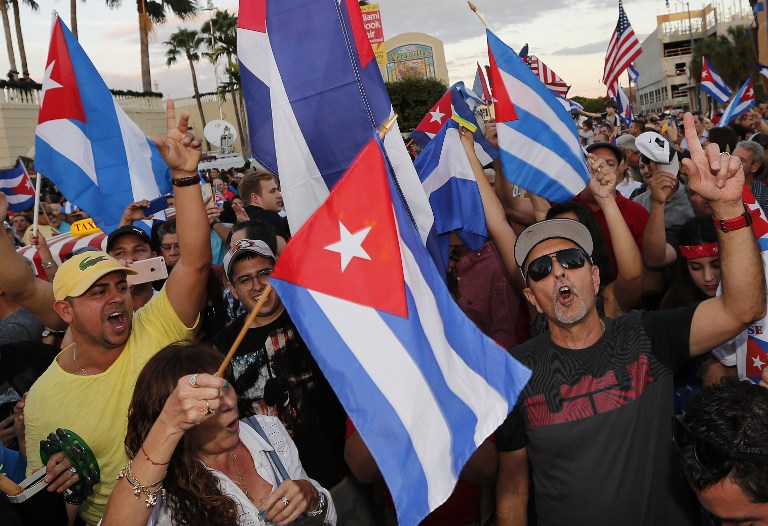


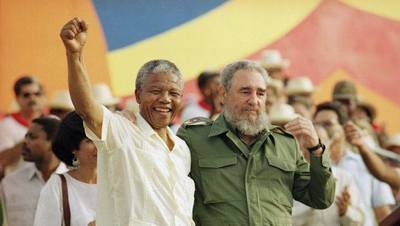

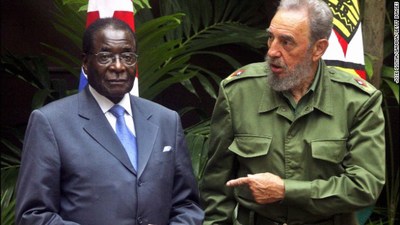
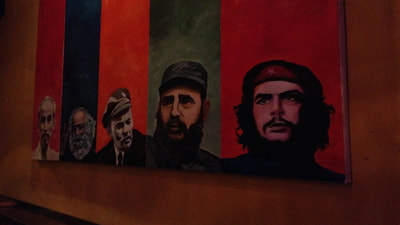
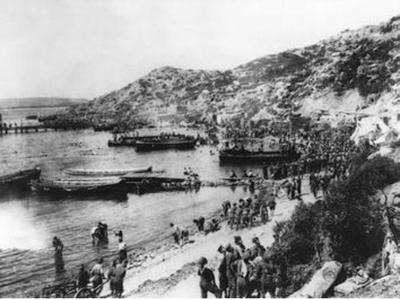
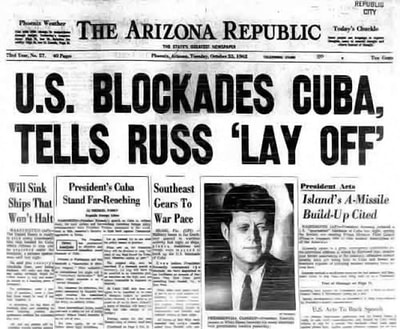
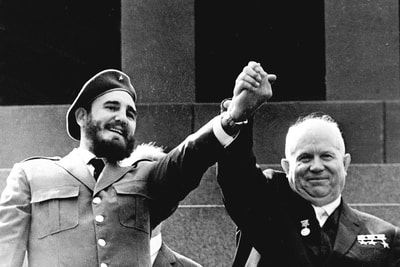
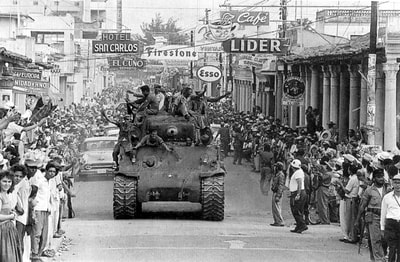
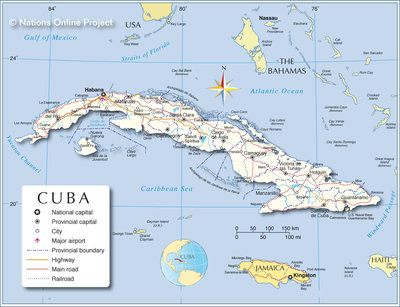
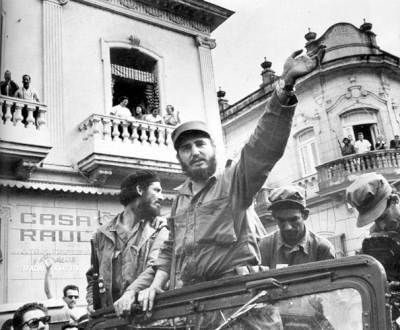
 RSS Feed
RSS Feed
